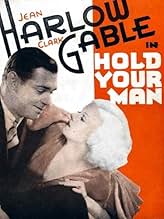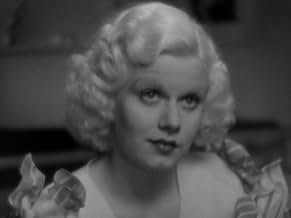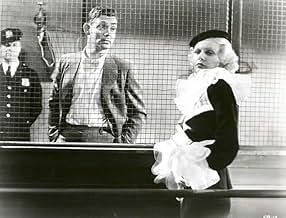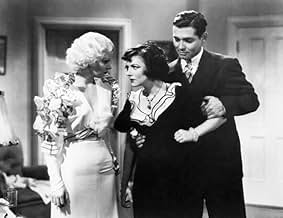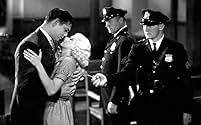Ajouter une intrigue dans votre langueA woman is sent to a reformatory when her con artist lover flees after killing a man during a botched blackmail scheme.A woman is sent to a reformatory when her con artist lover flees after killing a man during a botched blackmail scheme.A woman is sent to a reformatory when her con artist lover flees after killing a man during a botched blackmail scheme.
- Réalisation
- Scénario
- Casting principal
- Récompenses
- 2 victoires au total
Louise Beavers
- Elite Club Attendant
- (non crédité)
Wade Boteler
- Police Sergeant at Reformatory
- (non crédité)
Bobby Caldwell
- Ruby & Eddie's Son
- (non crédité)
Nora Cecil
- Miss Campbell
- (non crédité)
Jack Cheatham
- Policeman
- (non crédité)
G. Pat Collins
- Phil Dunn
- (non crédité)
Nell Craig
- Miss Willard - Reformatory Matron
- (non crédité)
Avis à la une
One of the great mysteries of life, suffered from daily, is why nice girls so often are more interested in the jerks and heels than in the nice guys.
Worse, when the nice guys even want to marry those girls, the girls STILL prefer the jerks and heels, even after the jerks and heels have shown their contempt, have shown they're just interested in using the girls.
Stu Erwin is the nice guy, who continues to be nice after being lied to and cheated and even after losing the girl completely.
Clark Gable is the jerk, and he is perfect in the role, rather a sad note to his fans.
Jean Harlow comes across as a more slender Mae West, even sounding like La West in some of her cynical throwaway lines.
Somewhat puzzling is that so many of the other characters, intended to be bad guys -- I mean, heck, they're locked up, so they must be -- are so obviously nice people.
In fact, there are lots of nice people here, people who, in a lesser film or story, would be snarling and back-stabbing but here go out of their way to help someone else.
So, maybe the story is rather clichéd, at least by modern standards, but ultimately the viewer will be glad to have watched.
The biggest complaint I have is that so many really good actors are not given credit. Once again, we can say a fervent "Thank You" to IMDb.com.
Worse, when the nice guys even want to marry those girls, the girls STILL prefer the jerks and heels, even after the jerks and heels have shown their contempt, have shown they're just interested in using the girls.
Stu Erwin is the nice guy, who continues to be nice after being lied to and cheated and even after losing the girl completely.
Clark Gable is the jerk, and he is perfect in the role, rather a sad note to his fans.
Jean Harlow comes across as a more slender Mae West, even sounding like La West in some of her cynical throwaway lines.
Somewhat puzzling is that so many of the other characters, intended to be bad guys -- I mean, heck, they're locked up, so they must be -- are so obviously nice people.
In fact, there are lots of nice people here, people who, in a lesser film or story, would be snarling and back-stabbing but here go out of their way to help someone else.
So, maybe the story is rather clichéd, at least by modern standards, but ultimately the viewer will be glad to have watched.
The biggest complaint I have is that so many really good actors are not given credit. Once again, we can say a fervent "Thank You" to IMDb.com.
Jean Harlow and Clark Gable star in "Hold Your Man," a film from 1933.
Gable plays con man Eddie Hall who runs into the apartment of Ruby Adams (Harlow) as he races to escape from the police. She's taking a bath and isn't happy having a strange man in her apartment. But Ruby has no problem taking care of herself.
Though she is dating a sturdy businessman (Stu Erwin) whom she attempts to con for her rent money, Ruby falls for Eddie. She falls for him so hard that she helps him with a con and winds up in prison. One day she gets dizzy. Well, we know what that means. But Eddie hasn't been in touch. Then, one day, she gets word of him from an unlikely person.
The highlight of this film is the snappy dialogue and the wonderful Harlow who, when she's offered a look at Gable's bedroom says, "Send me a picture of it." There was criticism here that when she went into prison, her personality changed, but I disagree. It's obvious in the beginning that she's interested in Eddie, and why wouldn't a woman in love, in prison, and pregnant, show vulnerability? That was the great thing about Harlow - underneath the street-smart wise cracks, there was a sensitivity.
Gable had been ascending the Hollywood ladder by leaps and bounds, and he is delightful here. Both he and Harlow play characters who put up a front, but ultimately their defenses come down.
I enjoyed it.
Gable plays con man Eddie Hall who runs into the apartment of Ruby Adams (Harlow) as he races to escape from the police. She's taking a bath and isn't happy having a strange man in her apartment. But Ruby has no problem taking care of herself.
Though she is dating a sturdy businessman (Stu Erwin) whom she attempts to con for her rent money, Ruby falls for Eddie. She falls for him so hard that she helps him with a con and winds up in prison. One day she gets dizzy. Well, we know what that means. But Eddie hasn't been in touch. Then, one day, she gets word of him from an unlikely person.
The highlight of this film is the snappy dialogue and the wonderful Harlow who, when she's offered a look at Gable's bedroom says, "Send me a picture of it." There was criticism here that when she went into prison, her personality changed, but I disagree. It's obvious in the beginning that she's interested in Eddie, and why wouldn't a woman in love, in prison, and pregnant, show vulnerability? That was the great thing about Harlow - underneath the street-smart wise cracks, there was a sensitivity.
Gable had been ascending the Hollywood ladder by leaps and bounds, and he is delightful here. Both he and Harlow play characters who put up a front, but ultimately their defenses come down.
I enjoyed it.
Hold Your Man (1933)
*** (out of 4)
MGM tearjerker has a couple con artists (Jean Harlow, Clark Gable) falling in love but after an accidental murder they're separated. Gable takes off and Harlow ends up in a reform school where she learns she's pregnant but fears that she'll never see her man again. I really wasn't sure where this thing was going as it blends a strange mix of comedy with drama but in the end I found it quite touching. The first half plays as a comedy and gets a lot of laughs including a hilarious scene where Gable tries hiding from the police by getting in a tub and putting soap all over himself. There are plenty of pre-code moments mixed in with most of them coming from Harlow showing off various limbs. Gable is as good as always but it's Harlow who really steals the show. This is the first time I've seen her take on a dramatic role and she nails it perfectly. She's given several emotional scenes and she comes off very well. The ending is very dramatic and contains a beautiful message that comes across very well. It's also worth noting that there's a black preacher in the film and I think this is the nicest role I've seen a black actor play in this era of Hollywood. The stereotypes we normally see in this type of film are thrown out the window and this must have been one of the earliest films to show a black man in such a nice form.
*** (out of 4)
MGM tearjerker has a couple con artists (Jean Harlow, Clark Gable) falling in love but after an accidental murder they're separated. Gable takes off and Harlow ends up in a reform school where she learns she's pregnant but fears that she'll never see her man again. I really wasn't sure where this thing was going as it blends a strange mix of comedy with drama but in the end I found it quite touching. The first half plays as a comedy and gets a lot of laughs including a hilarious scene where Gable tries hiding from the police by getting in a tub and putting soap all over himself. There are plenty of pre-code moments mixed in with most of them coming from Harlow showing off various limbs. Gable is as good as always but it's Harlow who really steals the show. This is the first time I've seen her take on a dramatic role and she nails it perfectly. She's given several emotional scenes and she comes off very well. The ending is very dramatic and contains a beautiful message that comes across very well. It's also worth noting that there's a black preacher in the film and I think this is the nicest role I've seen a black actor play in this era of Hollywood. The stereotypes we normally see in this type of film are thrown out the window and this must have been one of the earliest films to show a black man in such a nice form.
Love conquers all. That includes reality as defined in this pre-Code tearjerker. I would sympathize with the moral if the end weren't exaggerated into such a pile of mush. As others point out, the first half is sprightly as Gable and Harlow work the shady side of life. But then Gable accidentally kills a guy, while Harlow gets nabbed for a con job. So it's off to the hoosegow for both. Actually Gable drops out, while we follow Harlow's jaunt in a military- type slammer for women. Babes behind bars it ain't. The girls get to wear shapeless smocks, presided over by a bunch of long black crows (Patterson, et al.). One thing this segment proves—women can march from here to there in lockstep as well as men.
Some pre-Code highlights—Harlow in a gown unruffled by underwear; an actual socialist loudly denouncing the "system"; an unmarried Harlow with-child after an undisguised night with Gable; a peek-a-boo with Harlow in the bathtub. And though it's not pre-Code, the black minister and his inmate daughter rise above stereotype of the day. In fact, Theresa Harris is so winning as daughter Lillie Mae, she nearly steals the show. I can see why she had such a long career, even if mainly as menials.
The movie's a good look at MGM's golden twosome in their prime. And if the material falters, the stars manage to shine. So fans should be happy, despite the soggy ending.
Some pre-Code highlights—Harlow in a gown unruffled by underwear; an actual socialist loudly denouncing the "system"; an unmarried Harlow with-child after an undisguised night with Gable; a peek-a-boo with Harlow in the bathtub. And though it's not pre-Code, the black minister and his inmate daughter rise above stereotype of the day. In fact, Theresa Harris is so winning as daughter Lillie Mae, she nearly steals the show. I can see why she had such a long career, even if mainly as menials.
The movie's a good look at MGM's golden twosome in their prime. And if the material falters, the stars manage to shine. So fans should be happy, despite the soggy ending.
"Hold Your Man" is significant as Harlow's transitional film from the pre-code days. Although technically the Hays Code did not go into effect until July 1934, studios were to some extent trying to police themselves earlier than that to take some of the heat off. Harlow is significantly de-tuned physically here, from the hot presence a year earlier in "Red-Headed Woman" and "Red Dust". It also appears that to illustrate their ability to police themselves without a formal approval process, the studio tacked on a moralistic second half that turned a very entertaining romantic comedy into a sappy melodrama.
The film begins when depression-era hustler Eddie (Clark Gable) and his pal Slim con a pedestrian out of $30. Running from the police he blunders into an apartment and finds Ruby (Harlow) taking a bath. Ruby turns out to be a bit of a con artist herself and gets rid of the police. Eddie takes off but he has made an impression on Ruby and she arranges an "accidental" meeting. They soon fall in love but their marriage plans are interrupted by Eddie's accidental murder of one of Ruby's marks. He gets away but Ruby gets two years in a reformatory, which is portrayed as an intense Home Economics class.
Until it crashes and burns at the end this is a slick little romantic comedy written by Anita Loos (Gentlemen Prefer Blondes). Gable provides his standard bravado and Harlow gives it right back to him. The script is quite clever and entertaining. Gable does not have quite the chemistry with Harlow that he had with Claudette Colbert or Rosalind Russell, but this is the kind of film that is best when its two stars are competing instead of cuddling.
Unfortunately the audience's identification impulse and emotional connection are casualties of Harlow's abrupt personality change from gritty seductress to dewy-eyed self-pitying victim. This confuses and distances those who were most involved in the story until that point.
Then again, what do I know? I'm only a child.
The film begins when depression-era hustler Eddie (Clark Gable) and his pal Slim con a pedestrian out of $30. Running from the police he blunders into an apartment and finds Ruby (Harlow) taking a bath. Ruby turns out to be a bit of a con artist herself and gets rid of the police. Eddie takes off but he has made an impression on Ruby and she arranges an "accidental" meeting. They soon fall in love but their marriage plans are interrupted by Eddie's accidental murder of one of Ruby's marks. He gets away but Ruby gets two years in a reformatory, which is portrayed as an intense Home Economics class.
Until it crashes and burns at the end this is a slick little romantic comedy written by Anita Loos (Gentlemen Prefer Blondes). Gable provides his standard bravado and Harlow gives it right back to him. The script is quite clever and entertaining. Gable does not have quite the chemistry with Harlow that he had with Claudette Colbert or Rosalind Russell, but this is the kind of film that is best when its two stars are competing instead of cuddling.
Unfortunately the audience's identification impulse and emotional connection are casualties of Harlow's abrupt personality change from gritty seductress to dewy-eyed self-pitying victim. This confuses and distances those who were most involved in the story until that point.
Then again, what do I know? I'm only a child.
Le saviez-vous
- AnecdotesWhen Eddie is looking around Ruby's apartment, waiting for his clothes to dry, he spots a pennant on the wall that says "Albany Night Boat." That refers to the steamships that would depart New York City in the early evening for an overnight trip up the Hudson River to Albany. The ships had hundreds of staterooms and often were used---as the film's contemporary audience would know---for romantic getaways or illicit affairs. The pillow Eddie sees next also may have been a souvenir from the ship, as it's inscribed, "We're here to-day/To-morrow we're through/So let's be gay/It is up to you." Such trips peaked in the early 20th century, but started to decline in the 1930s when less costly, speedier, and more efficient modes of transportation by rail and automobile came to the fore. By the 1940s, the Albany Night Boat had virtually ceased to exist.
- GaffesWhen Eddie slams the door after tossing Aubrey Mitchell out of the apartment, the wall shakes.
- ConnexionsFeatured in Mademoiselle Volcan (1933)
- Bandes originalesHold Your Man
(1933) (uncredited)
Music by Nacio Herb Brown
Lyrics by Arthur Freed
Played on a record and sung by Harriet Lee
Reprised by Jean Harlow, playing piano and singing
Meilleurs choix
Connectez-vous pour évaluer et suivre la liste de favoris afin de recevoir des recommandations personnalisées
- How long is Hold Your Man?Alimenté par Alexa
Détails
Box-office
- Budget
- 266 000 $US (estimé)
- Durée1 heure 27 minutes
- Couleur
- Rapport de forme
- 1.37 : 1
Contribuer à cette page
Suggérer une modification ou ajouter du contenu manquant


